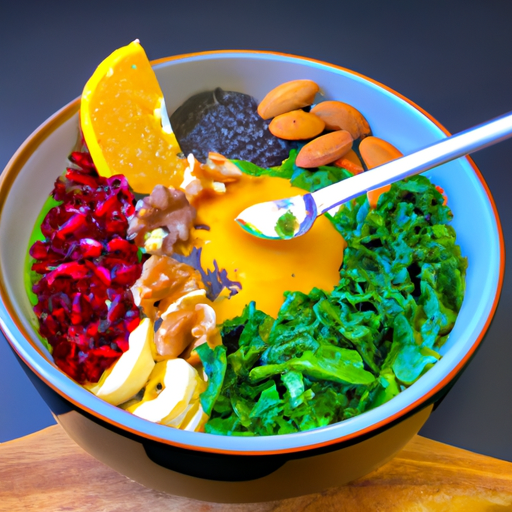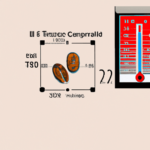Interested in learning about natural ways to improve your digestive health? Look no further – chia seeds are the solution! These tiny yet powerful seeds offer numerous benefits for our gut health.
In this article, we’ll explore why chia seeds are so beneficial for gut health. From promoting digestive regularity to supporting a healthy gut microbiome, chia seeds offer a range of advantages.
So, let’s dive in and discover how these little seeds can serve our bodies and improve our overall well-being.
Key Takeaways
- Chia seeds are packed with fiber, prebiotics, and omega-3 fatty acids, which all contribute to a healthy digestive system and promote gut health.
- Chia seeds aid in digestion and promote regular bowel movements by adding bulk to stool, regulating bowel movements, and preventing constipation and diarrhea.
- Chia seeds support a healthy gut microbiome by enhancing gut motility, regulating bowel movements, and acting as a prebiotic to nourish beneficial gut bacteria.
- Chia seeds have anti-inflammatory properties that reduce gut inflammation, soothe bloating and gas, and improve nutrient absorption in the digestive system.
Chia Seeds: A Natural Digestive Aid
Chia seeds actively support digestion as a natural aid. These tiny seeds are packed with fiber, which is essential for maintaining a healthy digestive system. Fiber acts as a natural remedy for various digestive issues, including constipation and bloating.

Chia seeds are also considered a gut-friendly food, as they contain prebiotics that nourish the good bacteria in our gut. These beneficial bacteria help break down food and absorb nutrients more efficiently.
Additionally, chia seeds are rich in omega-3 fatty acids, which have anti-inflammatory properties and can help reduce inflammation in the gut.
Incorporating chia seeds into your diet is an easy and effective way to support your digestion and promote overall gut health.
The Role of Chia Seeds in Gut Health
Continuing on from our previous discussion, it is important to highlight the role that chia seeds play in promoting gut health. Chia seeds have been found to have anti-inflammatory properties, which can help reduce gut inflammation. This is crucial because chronic gut inflammation has been linked to various digestive disorders, such as Crohn’s disease and ulcerative colitis.

Furthermore, chia seeds are known for their ability to aid in gut healing. They contain high amounts of soluble fiber, which helps to regulate bowel movements and promote the growth of beneficial bacteria in the gut. This can help repair and strengthen the gut lining, improving overall gut health.
To summarize the benefits of chia seeds in gut health, let’s take a look at the table below:
| Benefits of Chia Seeds in Gut Health | ||
|---|---|---|
| Reduces gut inflammation | Aids in gut healing | Promotes beneficial bacteria growth |
Incorporating chia seeds into your diet can be a simple and effective way to support your gut health and improve your overall well-being.
How Chia Seeds Promote Digestive Regularity
As we delve deeper into the topic of gut health, it’s important to explore how incorporating chia seeds into our diet can support digestive regularity.

Chia seeds are known for their ability to promote healthy digestion and improve gut motility. These tiny seeds are rich in dietary fiber, which adds bulk to the stool and helps prevent constipation.
The soluble fiber in chia seeds absorbs water and forms a gel-like substance in the digestive system, which aids in the smooth movement of food through the intestines. This helps to regulate bowel movements and prevent both diarrhea and constipation.
Additionally, chia seeds contain omega-3 fatty acids, which have anti-inflammatory properties and can further support a healthy gut.
Chia Seeds: Supporting a Healthy Gut Microbiome
One key factor in maintaining a healthy gut microbiome is incorporating chia seeds into our diet. Chia seeds have been found to improve gut motility, helping to regulate bowel movements and prevent constipation. They are rich in fiber, which adds bulk to the stool and promotes regularity. Additionally, chia seeds can enhance nutrient absorption in the gut. Their high fiber content acts as a prebiotic, providing nourishment for the beneficial bacteria in our gut. This, in turn, supports a healthy gut microbiome and improves overall digestion.

To further emphasize the benefits of chia seeds for gut health, consider the following table:
| Chia Seeds and Gut Health |
|---|
| Improve gut motility |
| Enhance nutrient absorption |
| Support a healthy gut microbiome |
| Aid in digestion |
| Promote regular bowel movements |
In the next section, we will explore how chia seeds can also help to soothe inflammation in the digestive system.
Chia Seeds: Soothing Inflammation in the Digestive System
To maintain optimal gut health, it’s important to incorporate chia seeds into our diet as they can effectively soothe inflammation in the digestive system. Chia seeds have been found to reduce bloating and gas, providing relief for those who experience discomfort after meals. This is due to their high fiber content, which helps regulate bowel movements and prevent constipation.
Additionally, chia seeds contain omega-3 fatty acids, which have anti-inflammatory properties that can reduce inflammation in the gut. By incorporating chia seeds into our diet, we can improve nutrient absorption in the digestive system. Chia seeds form a gel-like substance when mixed with liquid, which helps slow down the digestion process and allows for better absorption of nutrients.

Frequently Asked Questions
Are There Any Potential Side Effects or Risks Associated With Consuming Chia Seeds for Gut Health?
There may be potential risks and precautions to consider when consuming chia seeds for gut health. It’s important to be aware of any allergies, digestive issues, or medication interactions that could arise.
Can Chia Seeds Help With Specific Digestive Issues Such as Constipation or Diarrhea?
Chia seeds may help with specific digestive issues like constipation or diarrhea. They have been shown to alleviate symptoms of irritable bowel syndrome and reduce gut inflammation, making them beneficial for gut health.
How Should Chia Seeds Be Prepared or Consumed to Maximize Their Benefits for Gut Health?
To maximize the benefits of chia seeds for gut health, we recommend preparing them in chia seed gel or incorporating them into various chia seed recipes. These methods can optimize the digestion and absorption of their nutrient-rich properties.
Are Chia Seeds Suitable for Individuals With Certain Dietary Restrictions or Allergies?
Chia seeds are suitable for individuals with certain dietary restrictions or allergies. They can be a great alternative for those on gluten-free diets and can provide relief from common allergens.

Can Chia Seeds Replace Other Dietary Sources of Fiber in Promoting Gut Health?
Chia seeds are a great option for promoting gut health as they can replace other dietary sources of fiber. We can explore fiber alternatives and chia seed recipes to support a healthy and balanced digestive system.
Conclusion
In conclusion, chia seeds have been found to be a wonderful addition to support gut health. These tiny seeds act as a natural digestive aid, promoting regularity and soothing inflammation in the digestive system.
Additionally, chia seeds support a healthy gut microbiome, which is essential for overall well-being.
Incorporating chia seeds into your diet can be a simple and effective way to enhance your gut health and improve your overall digestive function.

















